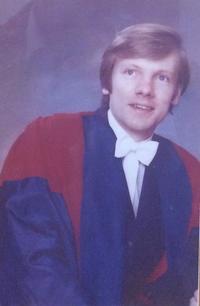The Lockwood Memorial Lecture
The Lockwood Memorial Lecture

The Lockwood Memorial Lecture and medal presentation commemorate the life and work of Dr Michael Lockwood, recognising in an annual event both senior figures and rising stars in practical ethics. Dr Lockwood worked both in the Faculty of Philosophy and the Dept. for Continuing Education, and it is appropriate to celebrate his commitment to both through a joint endeavour. The 2023 inaugural event coincided with the 5th anniversary of the MSt in Practical Ethics, a collaboration between the Faculty and the Department, and a programme of which Dr Lockwood would have been proud. We were delighted to share this event with both the public and the students and faculty on the MSt. course.
The 2023 Lockwood Medal was awarded to Prof Heather Widdows in June 2023. Prof Widdows spoke on the topic of ‘Naming and Shaming: Responding to Lookism’.
We will advertise the 2024 event in due course.
The 2023 Lockwood medallist: Prof Heather Widdows
Abstract: Lookism is an endemic form of discrimination, yet it is largely unrecognised and even when it is recognised, little action is taken to end it. I suggest that this can be explained, at least in part, by the shame that lookism invokes. Shame prevents calling out lookist comments, or appealing to legislation to object to unjust treatment. To address lookism we need to name lookism, something which is in its infancy and which philosophy can contribute to. However, naming lookism is not enough, we also need to change our emotional response to lookism, so we respond not with shame but with rage. Eventually, and over time, this will shift the shame from the victim to the perpetrator. Finally, I reject claims that lookism is normal or natural and something we should learn to live with.
Biography: Prof Widdows is based in the Department of Philosophy at the University of Warwick, where she specialises in applied ethics, global ethics, bioethics, moral philosophy and feminist philosophy. She is a member of the British Philosophical Association (BPA) Executive, and was Deputy Chair of the Philosophy sub-panel for REF 2021 and a member of the 2014 sub-panel. She also served on the Nuffield Council on Bioethics (2014-2020) and previously on the UK Biobank Ethics and Governance Council (2007-2013).
Prof Widdows co-runs the Beauty Demands Network and Blog with Dr Fiona MacCallum and founded the #everydaylookism project.
Dr Michael J Lockwood, 28/5/1944-24/6/2018: a biography by Dr Gillian M Lockwood
Michael was a war baby, the first of three children born to two classicists who had neither ever expected to marry, let alone have children! Both his parents were head teachers at private boarding schools and Michael’s early life was spent trying to please his father (who was very sporty and constantly exhorting him to ‘Go and play a manly game of Rugby’) and his mother who felt he should take advantage of the lessons in Greek and Latin she was so keen to provide. They found his interest in science and his love of drawing quite bewildering.
When his father died when Michael was just 11, he was effectively orphaned as his father had made no provision for his family and so, homeless, his mother went back to work as a Headteacher in Sussex and his adored little sisters were taken in as charity pupils at a boarding school near Slough. Michael was allowed to stay on in a ‘free’ place at his father’s last school, Plymouth College. Holidays were spent being passed around between whatever relations could be prevailed upon to have any of the children.
Michael read Philosophy and Psychology at Exeter College, Oxford and did his DPhil under the supervision of A.J Ayer. Having not quite finished his thesis before his funding ran out, he went to New York to complete it and he spent a few happy years as an Assistant Professor at NYU. He was early into the field of Medical Ethics and was delighted to be given a pager so he could be summoned to the bedside for consultations on resource allocation and quality of life issues.
When New York city’s financial crisis meant that all non tenure-track academics were immediately ‘let go’, he needed to find work in a hurry. He blagged his way into a job on the American Stock Exchange, reckoning that by the time his totally fictitious references had been checked he would have learnt enough to get by. When the day of reckoning came, he was offered a promotion, rather than the sack. He returned to Oxford when his dear friend Kathy Wilkes told him that the Junior Dean’s position was vacant at St Peter’s which would offer bed and board and the opportunity for lecturing in exchange for supervising bicycles and the boat club rowdies.
He taught for many Oxford colleges and especially enjoyed his time at Rewley House in the Department for Continuing Education. He called it ‘outreach philosophy’. Absent minded to a fault he once had to be collected from Swindon station at midnight as he had forgotten to get off the train in Oxford. He was conducting a seminar on ethics for the homeless people who had gathered there for warmth.
He started the first formal courses in Medical Ethics in the UK giving weekly symposia for The Society of Apothecaries for many years from the 1980s.
His published work reflected his diverse interests: medical ethics, consciousness, quantum mechanics and Time.
Mind, brain and the quantum: the compound ‘I’ : Blackwell 1989
The Labyrinth of Time : Introducing the Universe : OUP 2005
The Nature of Time : Blackwell 1987
Moral Dilemmas in Modern Medicine : Blackwell 1985
The Philosophical Imagination : An introduction to philosophy 1977
He was delighted to be awarded an Emeritus Fellowship at Green Templeton College and continued to write until the ravages of Alzheimer’s Disease could no longer be withstood. He died aged 74 at a care home in Headington, survived by his wife and three sons.
GML 09/05/2023



